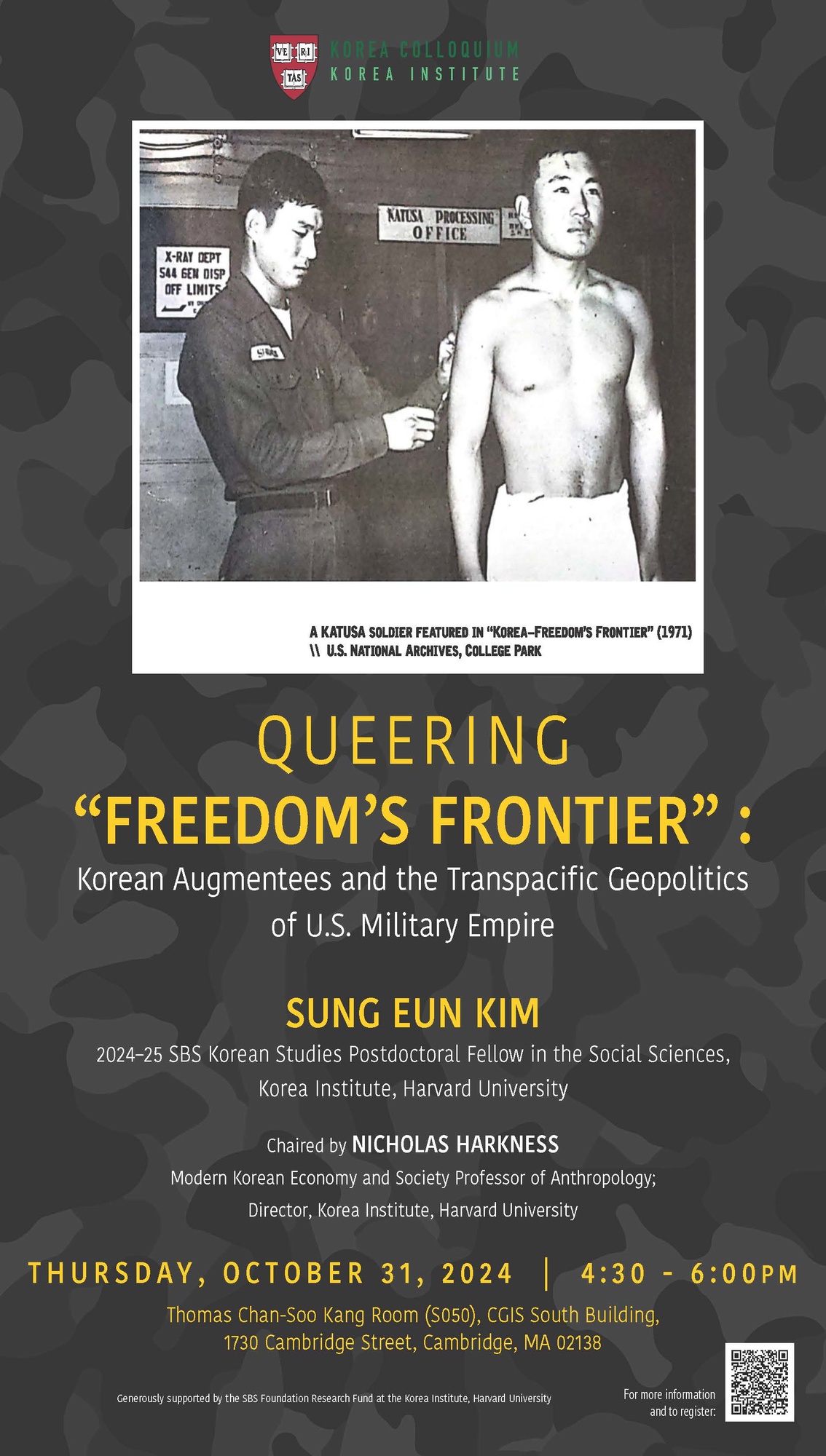time zone will be applied.
Report this post?

Date: Thursday, October 31, 2024, 4:30pm to 6:00pm
Location: Thomas Chan-Soo Kang Room (S050), CGIS South Building, 1730 Cambridge Street, Cambridge, MA 02138
Korea Colloquium
Sung Eun Kim is an interdisciplinary historian of modern Korea whose research focuses on the intersections of transnational Korean militarism and U.S. imperialism in the Asia-Pacific region, and the racial and sexual politics of colonial soldiering. He will begin his position as Assistant Professor of Korean Studies in the Department of Asian and Middle Eastern Studies at Duke University in the Fall of 2025. His research draws from the fields of Korean studies, critical race and gender studies, and U.S. war and empire studies to expand the question of U.S. colonialism in modern Korean history. He is currently working on his book manuscript, Transcolonial Korea: Race, Gender, and the Making of KATUSA under U.S. Military Empire, 1945–2010, which offers a critical history of the Korean Augmentation Troops to the U.S. Army, a unit of South Korean soldiers that have been conscripted into the U.S. Army in Korea from 1950 to the present. During his time at the Korea Institute, he will organize a symposium on the Transpacific Korean War, which will culminate in a co-edited special issue of positions: asia critique journal. He received his Ph.D. in modern Korean history from UCLA, his M.A. in East Asian Regional Studies from Columbia University, and his B.A. in Asian Studies and Political Science from Vassar College.
Chaired by Nicholas Harkness, Modern Korean Economy and Society Professor of Anthropology; Director, Korea Institute, Harvard University
Abstract:
In 2022, the Korean War Memorial on the National Mall in Washington, DC, was reopened with a new “Wall of Remembrance.” Emblazoned on the panels commemorating the war dead were over 7,000 Korean names. Hailed as a civil rights “victory” by then-President Barack Obama nearly a decade earlier, the Korean War, as enshrined in the Wall of Remembrance, now includes Korean Augmentation Troops to the U.S. Army, or KATUSAs, among America’s multiracial fallen sons. Who were these vaunted figures and what was their role at “freedom’s frontier”? As a term referring to an elite cadre of South Korean soldiers conscripted into the U.S. Army from the Korean War to the present, “KATUSA” is part of a military-imperial vocabulary in South Korea that has assigned value and status to the men who have served in this capacity. Yet what goes unseen in the celebration of KATUSAs in South Korea–and now, in U.S. official commemoration around the Korean War–is the centrality of their racialization and emasculation to the role they played under the U.S. military empire. By tracing KATUSA origins to a seldom-told tale of abduction off the streets of Korea and forcible removal to Occupied Japan where they were paraded naked as racialized emasculated bodies before throngs of Japanese women, this presentation reconsiders the significance of “freedom’s frontier,” an epithet most commonly associated with the demilitarized zone (DMZ), by analyzing the ambivalent sovereignty of the KATUSA. Not just a geographic metaphor, but an embodied one that encodes racial and sexual subordination, “freedom’s frontier,” I argue, must be understood as a homosocial zone of military-imperial proximity in which KATUSAs emerged in the early Cold War period as colonial abductee and glorified houseboy.
***
Generously supported by the SBS Foundation Research Fund at the Korea Institute, Harvard University
For more information, visit the website here